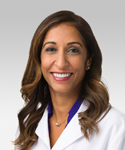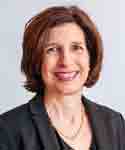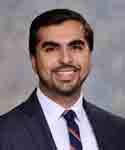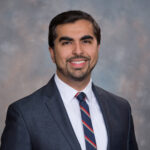 As COVID-19 suddenly interrupted most in-person activities this spring, interactive rheumatology education has flourished online, thanks to the new Virtual Rheumatology Learning Collaborative (ViRL). The eight-week program of 23 virtual didactic sessions streamed at 9 a.m. CST every Monday, Wednesday and Friday April 6–May 29, using Zoom interactive meeting software and hosted live on RingCentral through the ACR.
As COVID-19 suddenly interrupted most in-person activities this spring, interactive rheumatology education has flourished online, thanks to the new Virtual Rheumatology Learning Collaborative (ViRL). The eight-week program of 23 virtual didactic sessions streamed at 9 a.m. CST every Monday, Wednesday and Friday April 6–May 29, using Zoom interactive meeting software and hosted live on RingCentral through the ACR.
The new program’s name was meant to evoke the current coronavirus pandemic, says its creator, Anisha Bharadwaj Dua, MD, MPH, associate professor of medicine at Northwestern University Feinberg School of Medicine, Chicago. Within days of its launch the first week of April, ViRL actually went viral, attracting more than 1,200 registered participants from 143 institutions and 20 countries. Dr. Dua was also ViRL’s first speaker, presenting a lecture on therapeutic updates in anti-neutrophil cytoplasmic antibodies (ANCA) vasculitis on April 6. Sessions consistently attracted an average of 450 registered participants.
“The pandemic and physical distancing put a halt to our regular didactic program for rheumatology fellows, which is usually delivered through in-person discussions. We didn’t want to sacrifice the quality of education to our fellows,” she says. When one of her fellows, Sarah Fantus, told her about an online learning collaborative for urology with lectures from different institutions on one platform, Dr. Dua contacted program directors at other institutions, including Beth L. Jonas, MD, FACR, Reeves Foundation Distinguished Professor of Medicine, University of North Carolina, Chapel Hill, and chair of the ACR Committee on Rheumatology Training and Workforce Issues, to create a similar program in rheumatology—and 24 responded with offers to pool resources and provide speakers.
ViRL was launched within a week, with the ACR providing technical support. “It is amazing how quickly things can happen in a crisis,” says Dr. Dua.
Enriching Curriculum
One of the first speakers to join the ViRL faculty was Marcy B. Bolster, MD, director of the Rheumatology Fellowship Training Program at the Massachusetts General Hospital, Boston. She had worked with Dr. Dua on fellows’ education projects before, and she immediately agreed to deliver a lecture on May 8 called Osteoporosis: Treatment, Duration and Holidays.
“It is important, as a rheumatology program director, that we maintain fellows’ education in their chosen specialty,” and offer rheumatology education at a very high level, says Dr. Bolster.
In the spring, Dr. Bolster began serving on hospital rotations to treat COVID-19 patients or was at home providing care to patients through telemedicine. Many rheumatologists were suddenly unavailable to educate fellows in the clinic setting, she says. “With the ViRL lecture series, we can fill the gaps on so many levels. This lecture series provides an opportunity to connect when we are all working remotely. Sustained educational programming is a challenge, but this curriculum is very enriching. It’s new, innovative and fills gaps, and the topics cross a broad spectrum of rheumatology.”
ViRL lectures were designed for a core audience of rheumatology fellows, says Dr. Bolster. But residents, faculty and practicing rheumatologists, such as Mohammad Ursani, MD, CCD, RhMSUS, who practices at Millennium Physicians in The Woodlands, Texas, have registered too. He streamed sessions on ANCA vasculitis, spondyloarthritis, systemic lupus erythematosus and systemic sclerosis.
“I watched the lectures, because I believe it is very important to participate in lifelong learning,” says Dr. Ursani. “Rheumatology is changing at a very rapid pace, and it would be a complete disservice to our patients if we were not dedicated to keeping up with the most current data. It’s always a pleasure to have the opportunity to listen to the leading scholars of our field whenever the chance presents itself. Their enthusiasm and interest in their topic of focus are contagious.”
Because ViRL lectures streamed live during his normal clinic hours, Dr. Ursani appreciates the opportunity to catch recorded sessions after work. “The quality of the content is exceptional, and the topics are relevant and up to date. The speaker choice is also fantastic, given that they have an affiliation with the topics they speak about.”
Interactive Talks
Speakers presented one-hour lectures with slides, joined by a faculty member and a fellow moderator who field audience questions for the speakers submitted through an online chat function. Sessions were recorded and stored on the ACR website so registered participants may watch them later. The ACR staff has also provided technical support. ViRL sessions cover the gamut of rheumatology topics, from Scleroderma and the Gut to RA Pathogenesis to Cases and Mimics in Axial Spondyloarthritis. Written summaries are also available.
“I delivered the first lecture to make sure it worked. There’s a learning curve with Zoom. But it went very smoothly. More than 500 people actively streamed in, and they listened the whole time and seemed very energized,” says Dr. Dua. Her moderator, Dr. Jonas, fielded more than 100 questions from participants, then selected a few pertinent ones for Dr. Dua to answer.
ViRL has drawn registrants from as far away as the Philippines, France, Oman and Nigeria says Dr. Dua.
“It has gone very smoothly, and the ACR has made it free to all interested learners, [driving] international interest. People are joining in from different time zones and are able to access these great speakers. They can ask questions and answer each other’s questions. This is collaborative learning and teaching at the same time. It’s about leveraging other programs to tap into their deep expertise and knowledge,” she says. ViRL’s organizers are investigating how to make the lectures eligible for continuing medical education or maintenance of certification credits in the future.
Accessible Content
Participants appreciate the accessible, high-quality educational content, including Irene Blanco, MD, MS, director of the Rheumatology Fellowship Program, Albert Einstein College of Medicine, The Bronx, N.Y.
“The pandemic has completely disrupted life—and our training programs—in New York,” says Dr. Blanco. “We had to formally suspend our didactics given so many faculty and fellows are deployed to the COVID services. This [program] will help us all get our fellows the education they need in these fraught times. I love that program directors and faculty at other programs can help me ‘take care of my kids’ in this time. It makes my heart swell to be part of this community.”
One of her program’s first-year fellows, Jeanie Lee, MD, shares Dr. Blanco’s enthusiasm for ViRL. “[The sessions] are excellent. I particularly enjoyed the ANCA vasculitis lecture, with the evidence all condensed into one talk. The lectures have all been very clear, easy to follow and engaging. I have nothing but good feedback so far.”
Although the flexibility and convenience of remote learning programs like ViRL are benefits, some aspects of learning are lost, such as the ability to directly engage with rheumatologist peers or the instructor, says Dr. Ursani.
“This can ultimately hinder discussions that may answer a number of questions and encourage critical thinking. From the instructor standpoint, often during a lecture, one can sense the energy in the room and witness the ‘a ha!’ lightbulb moment. With remote learning, I believe this aspect is also lost,” he says.
However, he would like to see the ACR continue ViRL beyond the pandemic period. “Through this accessibility,” Dr. Ursani says, “rheumatology professionals and fellows in training can continue to benefit from experts in their respective fields despite not being in the same program or physical location as they are. It is a great opportunity for them to benefit from this knowledge and ultimately improve their patient care.”
Susan Bernstein is a freelance journalist based in Atlanta.





